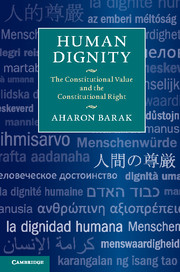Book contents
- Frontmatter
- Contents
- Preface
- Acknowledgements
- Table of Cases
- Part I Fundamental concepts and sources
- Part II Human dignity as a constitutional value
- Part III Human dignity as a constitutional right
- Part IV Human dignity in comparative law
- 11 Human dignity in American constitutional law
- 12 Human dignity in Canadian constitutional law
- 13 Human dignity in German constitutional law
- 14 Human dignity in South African constitutional law
- 15 Human dignity in Israeli constitutional law
- Bibliography
- Index
- References
14 - Human dignity in South African constitutional law
Published online by Cambridge University Press: 05 February 2015
- Frontmatter
- Contents
- Preface
- Acknowledgements
- Table of Cases
- Part I Fundamental concepts and sources
- Part II Human dignity as a constitutional value
- Part III Human dignity as a constitutional right
- Part IV Human dignity in comparative law
- 11 Human dignity in American constitutional law
- 12 Human dignity in Canadian constitutional law
- 13 Human dignity in German constitutional law
- 14 Human dignity in South African constitutional law
- 15 Human dignity in Israeli constitutional law
- Bibliography
- Index
- References
Summary
The provisions of section 10 of the South African Constitution
Section 10 of the Constitution of South Africa determines that human dignity is a constitutional right. It states:
Human Dignity
Everyone has inherent dignity and the right to have their dignity respected and protected.
Extensive judgments have interpreted this provision. Legal literature has studied the constitutional right and constitutional value of human dignity. It appears that Woolman is correct in stating that the South African jurisprudence regarding human dignity is the most developed, following that of the Constitutional Court of Germany. I should add that next to the German literature, the South African legal literature regarding its provision on human dignity is the most developed.
Human dignity in the Constitution of South Africa is characterized by four normative traits. First, human dignity is a relative right. Second, human dignity is not an eternal right; it can be amended. Third, human dignity is a supreme value, but is not the only supreme value. Fourth, the constitutional right to human dignity covers acts and omissions that at times overlap other constitutional rights, but it also covers acts and omissions that fall in its exclusive domain and are not included within the scope of other rights. I shall discuss each of these four traits in turn.
- Type
- Chapter
- Information
- Human DignityThe Constitutional Value and the Constitutional Right, pp. 243 - 279Publisher: Cambridge University PressPrint publication year: 2015



